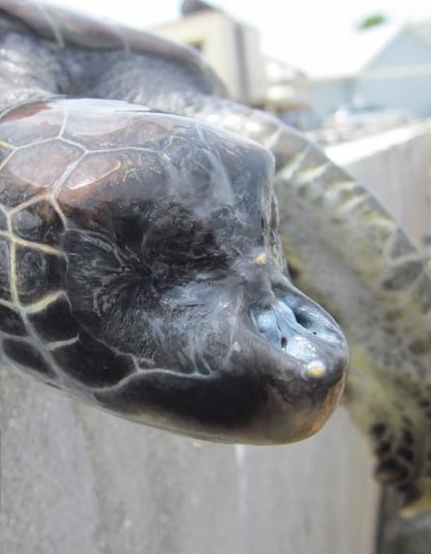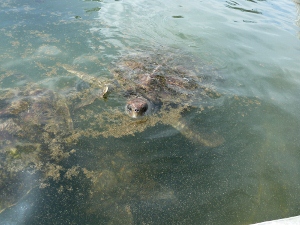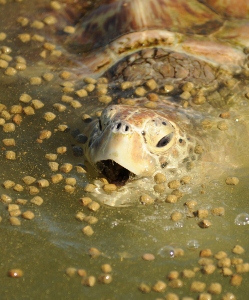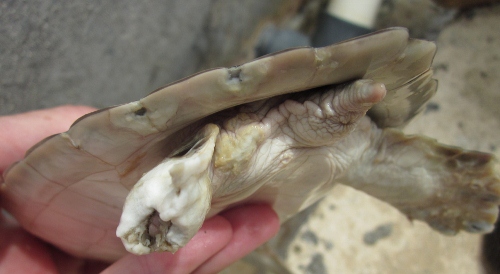Archive for October 13th, 2012

Report slams Turtle Farm
 (CNS): A global animal welfare charity has published a damning report on the Cayman Turtle Farm, which suggests that there are some serious shortcomings at the facility. The report by the World Society for the Protection of Animals (WSPA) found that the Farm is not meeting the welfare needs of the animals under its care and poses a threat not just to those animals but the wild population as well. It points to very poor conditions, including water quality, the turtles’ diet, disease, congenital defects in the captive bred creatures and overcrowding in the tanks. Criticising the organisation, government has denied the allegations and announced plans for an independent audit of CTF.
(CNS): A global animal welfare charity has published a damning report on the Cayman Turtle Farm, which suggests that there are some serious shortcomings at the facility. The report by the World Society for the Protection of Animals (WSPA) found that the Farm is not meeting the welfare needs of the animals under its care and poses a threat not just to those animals but the wild population as well. It points to very poor conditions, including water quality, the turtles’ diet, disease, congenital defects in the captive bred creatures and overcrowding in the tanks. Criticising the organisation, government has denied the allegations and announced plans for an independent audit of CTF.
Government and the CTF accused WSPA on Friday of making “spurious” and “sensational” allegations as part of its goal is to end the commercial farming operation and change the local culture because of a failure to understand Cayman.
 The Turtle Farm costs the public purse some CI$10 million in subsidies every year and the price of turtle meat which it produces has increased significantly. According to the research conducted by the WSPA, it costs each tax payer almost CI$12,000 to produce a turtle for meat. WSPA said it presented its report to the Cayman Turtle Farm much earlier this year but the CTF has not released or commented on the findings until now, which has come as a result of the WSPA’s decision to go public with its campaign to persuade government to change the farm to a real conservation facility.
The Turtle Farm costs the public purse some CI$10 million in subsidies every year and the price of turtle meat which it produces has increased significantly. According to the research conducted by the WSPA, it costs each tax payer almost CI$12,000 to produce a turtle for meat. WSPA said it presented its report to the Cayman Turtle Farm much earlier this year but the CTF has not released or commented on the findings until now, which has come as a result of the WSPA’s decision to go public with its campaign to persuade government to change the farm to a real conservation facility.
Government officials from both the premier’s ministry and the Turtle Farm released statements late Friday evening denying all the accusations and criticising the animal welfare organisation. It said it had never been accused of these things before and there was no evidence for the WSPA’s findings.
 “The CTF is subject to regular inspections by government entities, as well as independent external assessors, to ensure that it complies with health and safety regulations and provides a high quality and responsible tourism experience,” government said. “Prior to the claims by the WSPA, the Cayman Islands Government has never been confronted with allegations or claims of evidence of animal cruelty, nor has there been any suggestion whatsoever of risks to the health and safety of visitors who enjoy the attraction.”
“The CTF is subject to regular inspections by government entities, as well as independent external assessors, to ensure that it complies with health and safety regulations and provides a high quality and responsible tourism experience,” government said. “Prior to the claims by the WSPA, the Cayman Islands Government has never been confronted with allegations or claims of evidence of animal cruelty, nor has there been any suggestion whatsoever of risks to the health and safety of visitors who enjoy the attraction.”
However, the WSPA report includes details supported by damning pictures. The organisation also has film footage to support its claims showing disease, overcrowding, poor water conditions and many other problems at the facility. Calling for the farm to be converted into a conservation facility and to cease the commercial farming, which the activists say has been a failure, the WSPA has offered to assist in the transition, but it states that the Farm has not responded to that offer.
Government claims that the Turtle Farm has had discussions with the charity, which is when it agreed to independent examination of the WSPA’s claims.
“Notwithstanding the preponderance of evidence to the contrary, the allegations by the WSPA are being taken seriously,” government said, adding it that it would conduct an audit of the farm operations and the welfare of the animals in December. However, it said changing the model of the farm would require a political decision.
“In all meetings and communications with the WSPA thus far, it has been clearly stated that the decision to alter the business model and objectives of the Cayman Turtle Farm would require a decision by the Cayman Islands Cabinet, and a timeline was agreed and subsequently adjusted by both parties to enable these high-level discussions to take place,” the farm said in a statement released Friday afternoon.
But instead, the farm claimed, the WSPA has “embarked on a smear campaign to coerce the Turtle Farm to submit to the WSPA’s demands”, even though “their allegations are unfounded, erroneous and sensationalised,” the statement read.
The Turtle Farm said it found no evidence of the kinds of injuries or defects among the turtles that the WSPA is listing in its report. “Rather, we have instead succeeded in maintaining the health and well-being of our turtle population through established veterinary treatment protocols and methods,” it said.
However, for some time there have been major concerns about the farm’s hatch ratings, the death of hatchlings and other problems regarding the quality of the water and feed. More recently, a tank full of 300 turtles died as a result of some technical fault in a tank during repairs to a leak in the farm’s main pipe. A full explanation of what happened has not yet been given to the tax-payer.
The WSPA has a number of pictures clearly showing poor water quality, as well the over-crowded conditions, disease and defects in the population of turtles at the farm. It says that turtles need substantial amounts of good quality water but the tanks at the farm are not cleaned regularly, leaving uneaten food and voided faeces that quickly contaminate the living environment.
“The result is a foul mix of water, debris and pathogenic microorganisms including bacteria and viruses that pose a significant threat to turtle welfare,” the report found.
Among other criticisms WSPA notes that the turtles which would normally eat sea grass as adults in the wild are fed solely on a fish food pellets. It also describes the problems associated with the arbitrary handling of turtles by members of the public. It said this is stressful for the turtle and can lead to injury if the inexperienced handler drops a struggling animal. The report warns that with traces of disease and pathogens on the turtle visitors could also get sick.
 The WSPA says it saw significant evidence of congenital defects throughout the farm. “Many of these individuals exhibit anophthalmia (absence of one or both eyes) with marked skeletal deformities,” the report states. “In the wild, these deformities would most likely have resulted in early natural mortality … in the farm, their blindness renders them even more susceptible to injury and disease as a result of their reduced ability to feed and avoid co-occupant aggression.”
The WSPA says it saw significant evidence of congenital defects throughout the farm. “Many of these individuals exhibit anophthalmia (absence of one or both eyes) with marked skeletal deformities,” the report states. “In the wild, these deformities would most likely have resulted in early natural mortality … in the farm, their blindness renders them even more susceptible to injury and disease as a result of their reduced ability to feed and avoid co-occupant aggression.”
Although the turtle farm has claimed that it makes a significant contribution to conservation because of the release programme, the report states that the CTF’s conservation efforts may be negligible or even detrimental to wild turtle populations.
“Following a detailed assessment, WSPA also has severe concerns regarding the potential impact of the Cayman Turtle Farm on wild sea turtle conservation efforts,” it stated.
“We want to help the farm change for the better,” Dr Neil D’Cruze, the WSPA Wildlife Campaign Leader said in the wake of the release of the report. “But its unwillingness to meet us halfway is posing a great challenge. There’s a reason that CTF is the last turtle farm in the world – it’s an outdated model which no longer does justice to the Cayman Island’s turtle heritage.
“WSPA wants to work with the farm to turn the facility into a place that Caymanians can be proud of. Science and society moves on and WSPA would like to help CTF make a positive change, for the turtles, for tourism and for the island,” he added.
See statements from government and the WSPA report below.
See more on the campaign and images here
All pictures provided by WSPA.